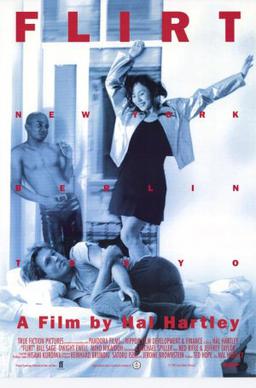Top Qs
Timeline
Chat
Perspective
Flirt (1995 film)
1995 film by Hal Hartley From Wikipedia, the free encyclopedia
Remove ads
Flirt is a 1995 drama film written and directed by Hal Hartley[2] and produced by Good Machine.[3]
Remove ads
Introduction
The story takes place in New York, Berlin and Tokyo, with each segment using the same dialogue.
In New York, Bill struggles to decide whether he has a future with Emily, while attempting to restrain Walter, the angry husband of a woman he thinks he might be in love with.
In Berlin, Dwight has a similar experience with his lover, while the events that befall Miho in Tokyo take a more dramatic turn.
Remove ads
Cast
- Bill Sage as Bill
- Dwight Ewell as Dwight
- Miho Nikaido as Miho
- Parker Posey as Emily
- Martin Donovan as Walter
- Hal Hartley as Hal
- Hannah Sullivan as Margaret
- Geno Lechner as Greta
- Toshizo Fujiwara as Ozu
- Chikako Hara as Yuki
- Peter Fitz as The Doctor
- Michael Imperioli as Concerned Bar Patron
- Harold Perrineau, Jr. as Man In Restroom #1
- Robert John Burke as Man In Restroom #2
- Liana Pai as Woman at Phone Booth
- Maria Schrader as Girl In Phone Booth
- José Zúñiga as Driver
- Holt McCallany as The Bartender
Remove ads
Reception
Summarize
Perspective
Critical reception
On the review aggregator website Rotten Tomatoes, the film holds an approval rating of 73% based on 11 reviews.[4] On Metacritic, the film has a weighted average score of 46 out of 100, based on 16 critics, indicating "mixed or average" reviews.[5]
Film critic James Berardinelli rated the film 2.5 out of 4 stars.[6] Roger Ebert of Chicago Sun-Times gave it 2 out of 4 stars, stating that "It is more amusing to talk about than to experience." While he expresses his appreciation of the film's experimentation and its illustration of the mantra that a film is about how it's presented rather than its subject matter, he opines that it is more of an intellectual exercise than an enjoyable watch.[7] Writing for SPIN, Michael Atkinson said that "by the third replay of the same dialogue, you're significantly less enchanted with the material than Hartley apparently is with himself."[8]
Alison Macor of The Austin Chronicle gave the film 3 out of 4 stars, describing it as an "intriguing ride" and as Hartley's most ambitious film.[9] Film critic Emanuel Levy described it as "a semi-academic treatise about the limits of narrativity," and opined that it "offers some minor rewards."[10]
References
External links
Wikiwand - on
Seamless Wikipedia browsing. On steroids.
Remove ads

